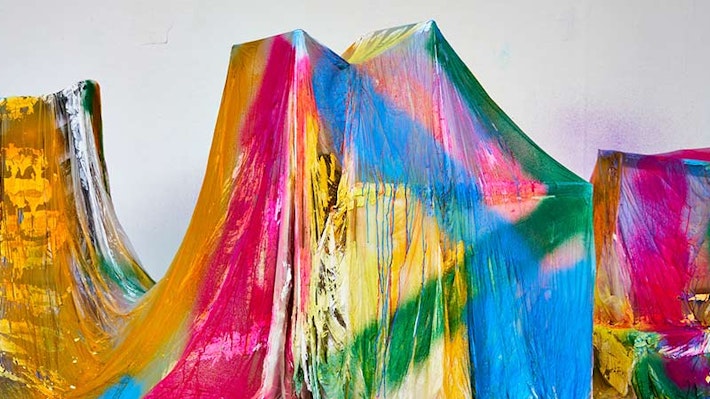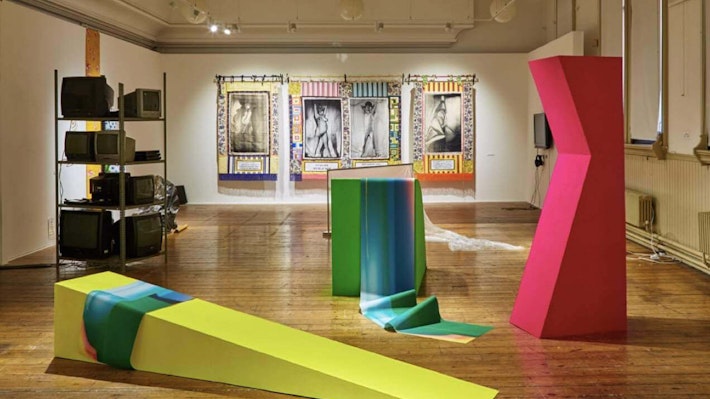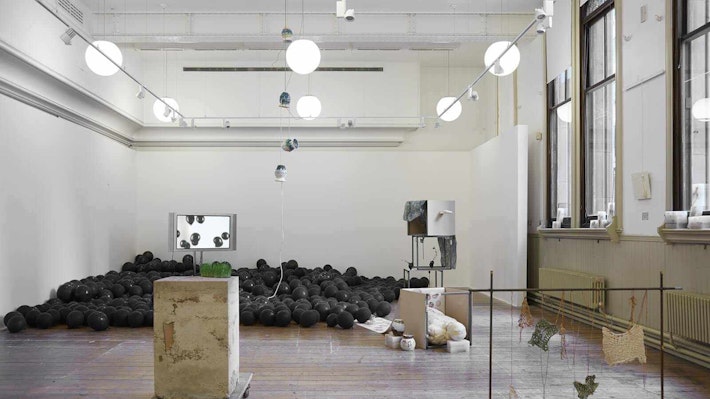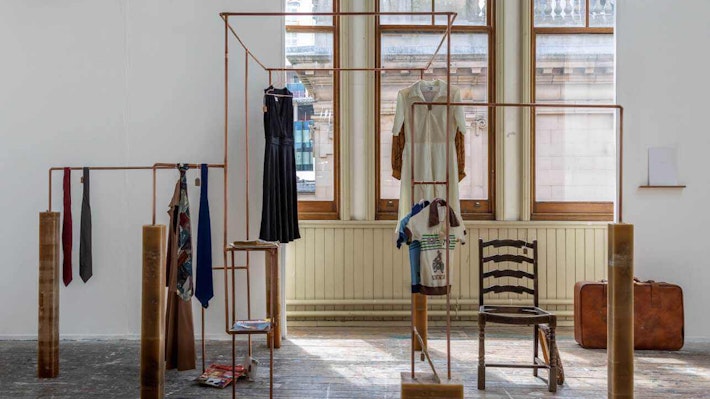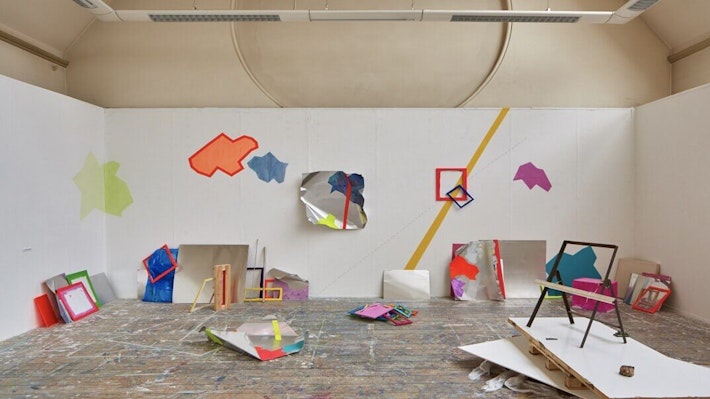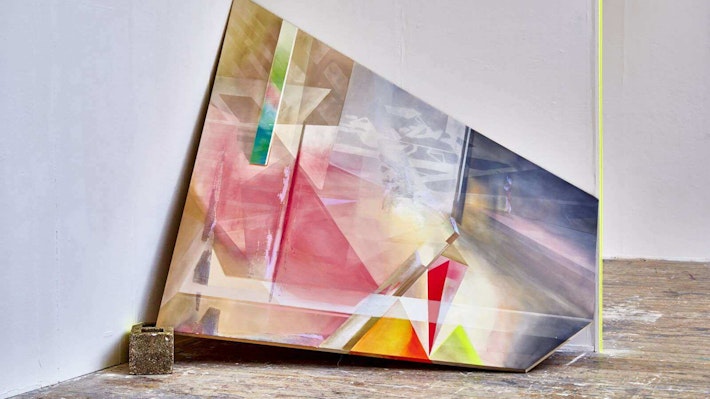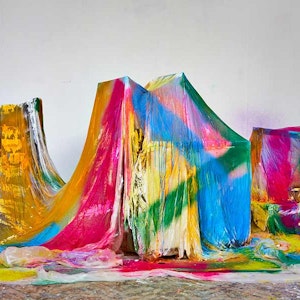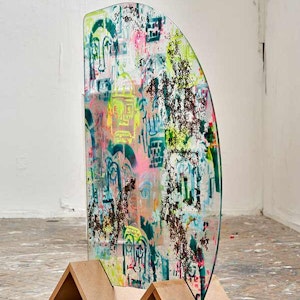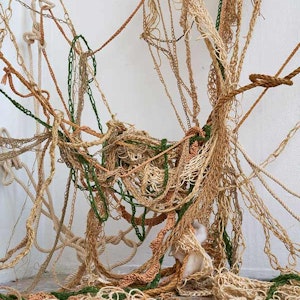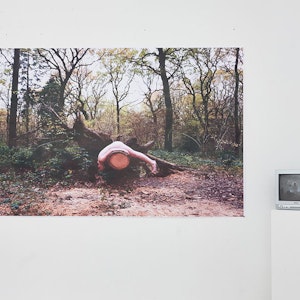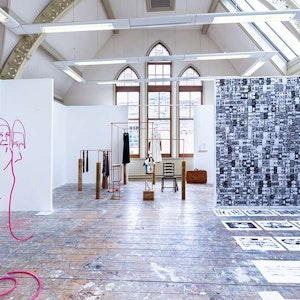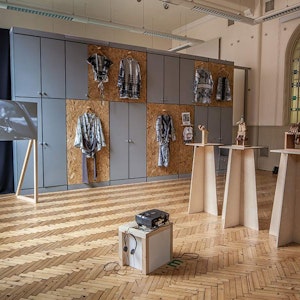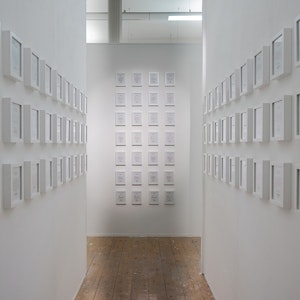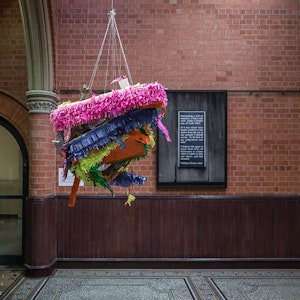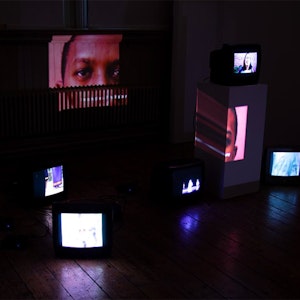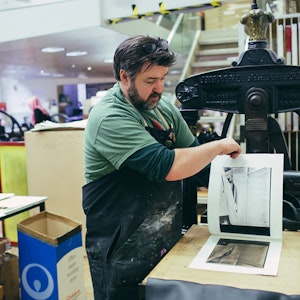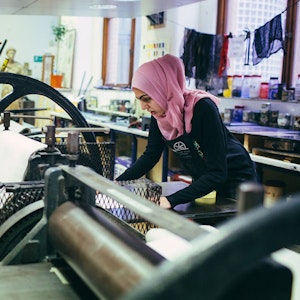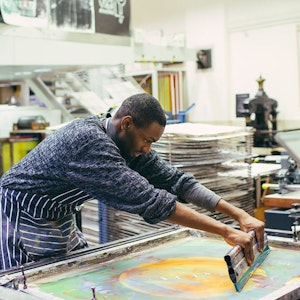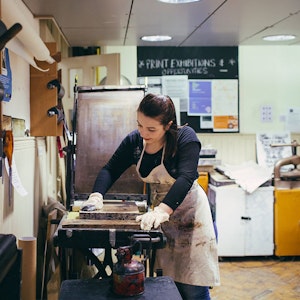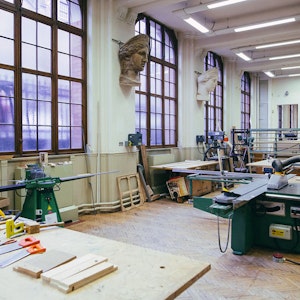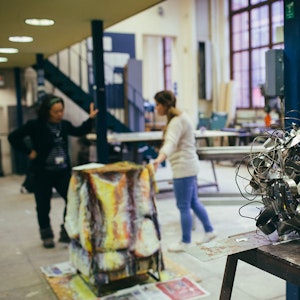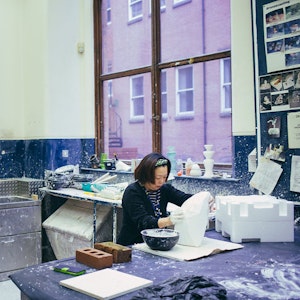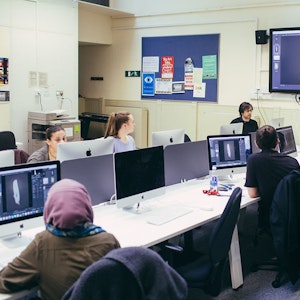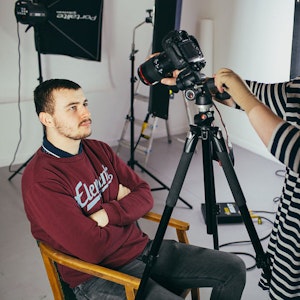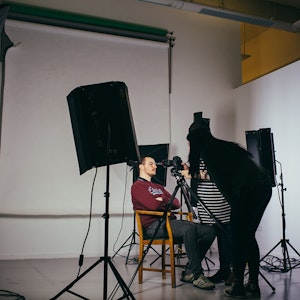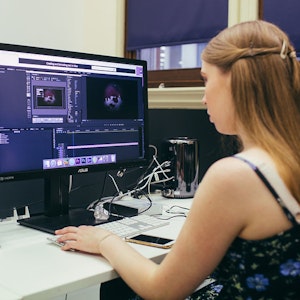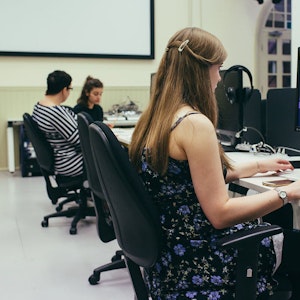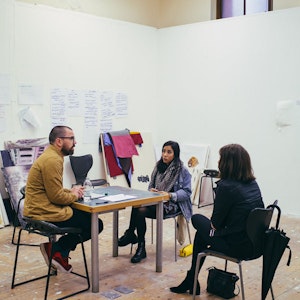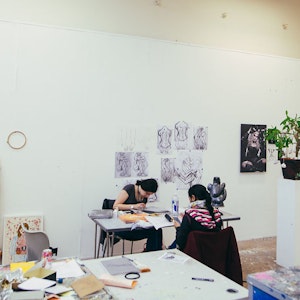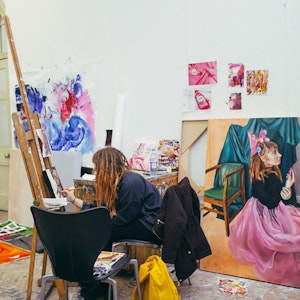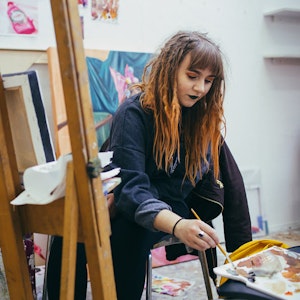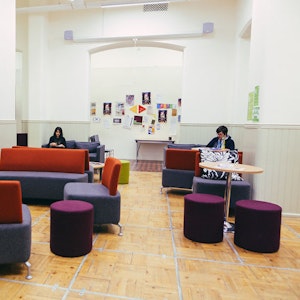Fine Art with a Foundation Year - BA (Hons)
Currently viewing course to start in 2024/25 Entry.
This four-year BA (Hons) Fine Art with a Foundation Year course has been specifically designed to allow you to undertake an additional year of study which will build stronger creative footings to ensure successful progression through your chosen degree course....
- Level Foundation
- Study mode Full Time
- Location Margaret Street
- Award BA (Hons)
- Start date September 2024
- Fees View course fees
- School Birmingham School of Art
- Faculty Faculty of Arts, Design and Media
This course is:
Open to International Students
Overview
This four-year BA (Hons) Fine Art with a Foundation Year course has been specifically designed to allow you to undertake an additional year of study which will build stronger creative footings to ensure successful progression through your chosen degree course.
Working in a friendly, lively and energetic environment, you will be given the freedom to expand your knowledge of practical skills, creative exploration and conceptual thinking, underpinned by broad critical understanding, academic writing and emerging theoretical principles.
Dedicated Foundation tutors will support you throughout the year and BA teaching staff from across all the schools within the Birmingham Institute of Creative Arts (BICA) will work closely with you to prepare you for progression.
There will be a range of opportunities to work on collaborative and individual projects, aimed to build your social skills and identify your role as a developing practitioner.
Throughout the year you will be challenged with projects that question your current creative experiences and explore a breadth of experimentation to broaden your technical and critical understanding.
You will be encouraged to analyse methods and materials appropriate for creative development and to question your position in relation to historical, contemporary and future world scenarios. Both practical and written research tasks will be supported by one to one tutorials and small discussion groups to help you constructively build academic and social confidence.
The first two semester modules will form the building blocks for future work and will explore core principles of creative practice focussing on the development of technical confidence, study skills and productivity.
The two final semester modules will encourage a positive integration between research and practice, challenging decision making and technical competency.
This semester is designed to empower you with independent learning kills appropriate for your future BA studies.
On successful completion of the Foundation Year, you will have the flexibility to change direction and switch courses onto a related undergraduate degree programme within Birmingham School of Art, School of Visual Communication or the School of Games, Film and Animation.
BA (Hons) Fine Art
Through the skilful manipulation of materials, processes and ideas artists are able to offer creative insights which shape who we are and how we exist in the world around us. These are valuable skills in the fast changing and interconnected web of ecological, political and socio-economic and philosophical contexts.
Our BA (Hons) Fine Art course embraces important traditional making skills (such as painting, drawing, sculpture, installation, digital media and performance), and places an emphasis on the fusion with new developments in creative practice framed within a professional working context to improve employability. This hybrid approach, coupled with discipline-specific studios and specialist workshops, will equip you to navigate the growing and changing face of the Creative Industries into the future.
The course is positioned within the School of Art, which has a longstanding and active internationalised profile and agenda. The specialist knowledge of the Centre for Chinese Art is drawn upon to broaden international partnership opportunities and to ensure that global perspectives are continually reflected in the curriculum.
The course provides the ability to study in one of the UK’s most historic art schools. You will learn to develop your own creative practice in a thriving creative community in the heart of the UK’s second city on a course which mixes traditional surroundings with current international debates. The ability to develop your own individual practices alongside a range of local institutions and industries will give a unique insight into the culture and markets of the UK.
The course directly responds to the cultural industries within the context of the West Midlands, as a lens in which to understand, approach and position ideas and skills amongst a global art sector. The BA (Hons) Fine Art with Foundation Year course considers the universal breadth of art practice as you are introduced to contemporary and historical contexts on an international scale; taking account of global, national and local perspectives.
Actively working to challenge the traditional canon, you will be exposed to practices and artists that reflect the diverse nature of our student body. Teaching and learning on the BA (Hons) Fine Art with Foundation Year course is an active experience, engaging you in a range of projects that involve working with industry partners from diverse cultures, backgrounds and contexts; nationally and internationally.
The communities of practice you engage with, and collectively establish, will have both a local and global focus and reach. You will be encouraged to become aware of ethical and inclusive practices and how this may shape your contributions to the creative and cultural sectors in the region, and beyond.
What's covered in this course?
Our BA (Hons) Fine Art course is based on four key principles which form pillars of skill development, knowledge and understanding; Making Skills, Making Public, Making Communities and Making a Living.
Making skills are developed through our purpose-built studio spaces where you can explore the materials and processes of painting, drawing, sculpture, installation, digital media and performance. The acquisition and application of technical skills are also developed in our workshops and by working with fabricators from across the vibrant city of Birmingham and beyond. These skills will act as the means through which to test, interrogate, and transform art practice both conceptually and aesthetically.
Making Public is focused on exploring art practice in the public realm. This involves expanded ideas of exhibiting and sharing outcomes that generate participation with broad audiences. You will benefit from live projects and our close links to high-profile establishments including: Eastside Projects, Grand Union, Ikon Gallery and Birmingham Museum and Art Gallery. These opportunities will develop your thinking around the process of making your work public.
Making with Communities asks you to consider ways of building and sustaining meaningful relationships between your art practice and society. You will form Communities of Practice through studio groups before engaging with local, national and international organisations, gaining cultural and global experiences, perspectives and knowledge. This valuable experience will help you to define the kind of future practice you may wish to pursue.
Making a Living places an important focus on your own personal development and the multiple ways of building and growing a successful creative career. This involves establishing a professional context for your work through a situated knowledge of the art sector. The advancement of the digital world has afforded artists a wide variety of ways to thrive in a creative environment. You will be taught a whole set of new skills and behaviours necessary for you to be ready for the exciting challenges that await you in the world of employment beyond your studies.
Grand Union and the Birmingham School of Art are part of the same arts ecology in the city, the region and beyond. By embedding employability into all stages of the curriculum of the BA Fine Art course students graduate with the skills and confidence to flourish in the contemporary art world and the wider creative industries.
Cheryl Jones, Director Grand Union
Why Choose Us?
- Margaret Street, the home of Birmingham School of Art, was the first municipal art school in the UK. Its Grade I-listed building has been the inspiration for countless artists and practitioners of international repute. It is a site of creative art practice that resonates with its rich history and as a fine art student you would be joining a community of like-minded individuals who learn, make and grow here.
- You will work across specialist dedicated studio spaces which support the development of painting, drawing, sculpture, printmaking, installation, digital media and performance skills.
- Our emphasis on Making Skills, Making Public, Making a Living and Making with Communities places a focus on the development of technical and practical skills, valuable not only to the production of artwork, but to your ability to make a living through employing these skills, post-graduation, within a number of sectors who you will build networks with.
- You will have regular opportunities to exhibit your work through curating student-led exhibitions in the School of Art and in spaces across the city, culminating in the Graduate Show in your final year.
- The course draws on Birmingham’s unique position as the No. 2 city in the UK. The city has a rich cultural and industrial history which is embedded in the course, students will engage with Birmingham’s past and with the exciting contemporary environment of the city today.
- The courses central location, is positioned as part of the culturally diverse and thriving art scene of Birmingham. The relationship to the city and its range of communities, galleries and arts organisations is a defining and unique feature of the course. The course integrates skilled, informed and industry-ready students into the creative industries through public facing and live working opportunities with external partners.
Similar Courses
- Fine Art - BA (Hons)
- Illustration with a Foundation Year - BA (Hons)
- Art and Design with a Foundation Year - BA (Hons)
- Graphic Design with a Foundation Year - BA (Hons)
- Photography with a Foundation Year - BA (Hons)
- Design for Performance: Theatre, Film and Live Events with a Foundation Year - BA (Hons)
Open Days
Join us for an on-campus Open Day where you'll be able to meet us in person. Booking for the next event isn’t open yet. Register your interest below and we’ll email you as soon as booking goes live.
Next Open Day: 29 June 2024
Entry Requirements
These entry requirements apply for entry in 2024/25.
All required qualifications/grades must have been achieved and evidenced at the earliest opportunity after accepting an offer to help confirm admission and allow for on-time enrolment. This can also include other requirements, like a fee status form and relevant documents. Applicants can track their application and outstanding information requests through their BCU mySRS account.
80 UCAS tariff points
If you have a qualification that is not listed, please contact us.
Fees & How to Apply
UK students
Annual and modular tuition fees shown are applicable to the first year of study. The University reserves the right to increase fees for subsequent years of study in line with increases in inflation (capped at 5%) or to reflect changes in Government funding policies or changes agreed by Parliament. View fees for continuing students.
Award: BA (Hons)
Starting: Sep 2024
- Mode
- Duration
- Fees
- Full Time
- 4 years
- £9,250 in 2024/25
- Apply via UCAS
International students
Annual and modular tuition fees shown are applicable to the first year of study. The University reserves the right to increase fees for subsequent years of study in line with increases in inflation (capped at 5%) or to reflect changes in Government funding policies or changes agreed by Parliament. View fees for continuing students.
Award: BA (Hons)
Starting: Sep 2024
- Mode
- Duration
- Fees
- Full Time
- 4 years
- £16,085 in 2024/25
Guidance for UK students
UK students applying for most undergraduate degree courses in the UK will need to apply through UCAS.
The Universities and Colleges Admissions Service (UCAS) is a UK organisation responsible for managing applications to university and college.
Applying through UCAS
- Register with UCAS
- Login to UCAS and complete your details
- Select your course and write a personal statement
- Get a reference
- Pay your application fee and submit your application
You are not required to submit a portfolio for this course.
Course in Depth
Foundation Year
Throughout the year you will be challenged with projects that question your current creative experiences and explore a breadth of experimentation to broaden your technical and critical understanding.
You will be encouraged to analyse methods and materials appropriate for creative development and to question your position in relation to historical, contemporary and future world scenarios. Both practical and written research tasks will be supported by one to one tutorials and small discussion groups to help you constructively build academic and social confidence.
The two first semester modules will form the building blocks for future work and will explore core principles of creative practice focussing on, the development of technical confidence, research, study skills and productivity.
The two final semester modules will give you greater autonomy, encourage positive integration between research and practice, challenging decision making and technical competency. This semester is designed to empower you with independent learning skills appropriate for your future BA studies.
In order to progress onto your BA Programme, you must successfully pass all four core modules (totalling 120 credits).
This module explores the term ‘practice’ as the process of making, developing and recording information. We will work with you to explore the development of your work based on a set project, looking at a number of documentation strategies while experimenting with a broad range of materials. You will have the opportunity to meet artists and practitioners through local gallery visits and in studio activities and will learn to analyse your work through tutorials and small group discussions.
Artists work in a globally influenced, culturally diverse, and technologically advancing world.
Their art is a dynamic combination of materials, methods, concepts, and subjects that challenge traditional boundaries and defy easy definition.
This module will look at experimental approaches to drawing to identify radical new solutions from the perspective of the contemporary world we live in.
During this module you will meet lecturers, researchers and partners from across BCU, the city and further afield to open your understanding of practiced based creative work.
Through lectures and workshops, you will be introduced to the versatility of subject areas in terms of ideas, development, research, materials, techniques and contexts.
Figuring out how the universe works might be a bit more than we need to do each day but paying attention to the future of the world we live in, is worth exploring.
Creative realisation is not just about the practice of producing creative responses, it is about identifying the factors that generate creative thinking and facilitating the process.
For this module you will draw on your own creative strategies to facilitate the development of a project that is appropriate for progression onto your chosen BA (Hons) course.
First Year
At Level Four you are given real world examples of diverse practitioners in order to gain knowledge and understanding of the structures and ecologies of contemporary art practice.
This is delivered concurrently with introductions to workshops and specialist studio spaces to allow you to begin to develop your own creative language, interests and skills whilst beginning to consider different ways of thinking about your own emerging practice and the world in which it sits.
You will learn how to research and drive forward ideas that will form the basis of your studio and workshop experiments. In turn you will learn what it means to make art as a practice and how to communicate and nurture it through varied approaches. These approaches will embrace working both individually and supportively with others to share your work with wide ranging audiences both within and beyond the University.
In order to complete this course you must successfully complete all the following CORE modules (totalling 120 credits).
Acting as a bridge between your prior study and your development on the course, Making Studio asks you to respond to a series of short projects designed to encourage a thoughtful and experimental approach to art making. Each project is designed to help broaden your understanding of art, its modes of production and how it critically operates within the world. You will engage with a wide range of research, materials, methods and processes as well as being introduced to important contemporary and historical ideas and contexts. The studio plays a pivotal role in your development, working as a flexible, fluid and evolving site for art making, sharing and thinking: A space to make work, build communities and allow creative working relationships to form. The module is delivered through lectures, practical workshops, seminars and tutorials. An analytical and reflective account of all projects will be documented in individual process books.
At each level of the course you will think about making a living. At the heart of this will be the development of a personal portfolio of knowledge and skills that you will start at the first year of the course at Level Four and continue throughout. In this module you will begin to think about the way that other practitioners make a living, develop careers and sustain their practices through the application of their skills. You will consider the wider context for your practice through individual research and develop new skills that will underpin your development on the course and beyond. You will be inducted into a number of workshops across the School of Art developing important practical skills in woodwork, metal, printmaking or textiles processes for example. Alongside this you will develop technical skills that will support you in building your own website which will act as an online portfolio documenting your own unique set of skills and the development of your specific practice.
In Making Meaning you will build your own individual project brief. You will be guided through this process with the introduction of three key elements or building blocks, which consist of; a central interest or theme, an identified method and community. Having done so, you will undertake; research, material experimentation and critically reflect on and resolve outcomes. The research and reflection will underpin the writing of an essay that contextualises your work in relation to contemporary and historical art practices. An analytical and reflective account of this project journey will be documented.
Making Public explores the relationship between art and audience. You will investigate contemporary modes of dissemination, strategies of engagement and forms of communication. You will have the opportunity to; exhibit, broadcast, publish and perform, making your individual practice public. Working with your community of peers, you will organise public facing exhibitions, interventions, publications and/or live events to test your ideas. You will develop and produce external facing platforms and outputs that engage audiences and interrogate the notion of public production. Throughout this activity, you will develop essential professional skills. You will research the various roles that artists assume in making work public; the artist as curator, artist as exhibition coordinator, artist as marketing strategist, artist as technician and artist as producer. Through activating your practice and engaging audiences, you will gain an understanding of a range of professional contexts that exist in the expanding field of contemporary fine art.
You will learn strategies to activate physical and virtual spaces, working within the School of Art and the city. Working together on and off site, you will make your work visible in an ethical, inclusive and sustainable way.
Second Year
At Level Five the emphasis shifts to encompass a more individually driven approach that provides the opportunity to build on the skills gained at Level Four to grow your ideas both conceptually and contextually. Level Five also highlights the value of working outside of the School of Art to test out ideas in real world contexts with external partners.
Through this instrumental experience you will gain insights into the relationship between theory and practice; contemporary theoretical and social contexts, to think through how they relate to your own work. You will begin to consider the ways that you might sustain your practice and/or secure employment after graduation through the skills and experiences you acquire throughout the stages of the course.
In order to complete this course you must successfully complete all the following CORE modules (totalling 100 credits):
This module expands your understanding of the relationship of theory and practice. Through this module you will be introduced to a number of key themes, each dealing with a different research topic and practical consideration aligned with studios and workshops as you engage with these as sites and communities of making. In response to these key themes you will explore what it means to take different theoretical ideas through various material, technical and conceptual processes in the development of a research-informed body of work.
This module encourages you to consider ways of sustaining meaningful relationships between art practice and society in understanding the value and potentials of making a living by working with communities. Through building networks with diverse communities to create relationships with the city and the people that live here you will explore what values can be fostered by working with others in understanding the expanded role of the artist culturally. You will consider the meaning of your work and its potential impact both within the field of contemporary art and in its wider economic and social context in developing an outcome, project or initiative that has a shared goal for mutual gain.
This module introduces you to practice based research and the notion of practice as a research activity which supports you in developing your individual practice. You will identify key ideas that frame your work and consider how these ideas inform the materials you work with, contexts you work within and the decisions you make in the studio and workshops. You will develop your own research informed output which you will work with peers to then publish to make public.
In order to complete this course you must successfully complete at least 20 credits from the following list of OPTIONAL modules.
This module provides an opportunity for you to respond to and then apply your knowledge and skills to an external context. The module focuses on real-world, live learning through working with communities, organisations and/or audiences outside of the art school. This module supports you in gaining valuable links, networks, experiences and skills to prepare you for a career in the broad, ever-changing, creative industries.
This module enables you to develop professional attributes and subject skills through direct experience in the work place. Supported by academic staff you will research and build important communication skills through the process of arranging a placement in a context relevant to your individual potential career trajectory that you have begun to identify.
Core modules are guaranteed to run. Optional modules will vary from year to year and the published list is indicative only.
Final Year
In the final year of the course you will pursue an individual mode of study that is supported by a range of subject specific staff and the configuration of this will be dictated by your developing art practice.
At this stage in the course you will confidently consolidate thinking, ideas, research and making to create a body of work which has a clear understanding of where it sits in the world. The public outcome of your final artworks will act as a springboard platform for your future career which will be underpinned by the comprehensive plan you will have prepared for life after graduation.
As a community we value and encourage your engagement with us after your course ends and we have developed a number of helpful ongoing learning approaches to continue to support our important alumni.
Throughout the course your learning is supported by technical workshops, lectures, presentations, seminars and live project briefs. There are multiple opportunities to collaborate with others and to select your own individual pathway through the course (through optional module choices).
In order to complete this course you must successfully complete all the following CORE modules (totalling 120 credits).
The purpose of the module is to enable you to undertake a sustained, in-depth and theoretically informed research project exploring an area that is of personal interest to you. It is important that we can support you appropriately, so you will be guided towards choosing a research topic which is relevant to your discipline and in which your lecturers have expertise. The outcome takes the form of a written text and a practice-based portfolio.
This module will give you the tools you need to make your work public in ways that are responsive to the ideas, methods and materials that underpin your practice. You will exhibit, perform and show your work throughout the academic year and talk about your work in public with confidence and in a way that is generous to diverse audiences. You will use your personal portfolio of knowledge and skills to make a three-year plan that demonstrates your career ambitions. This should be ambitious but achievable and will evidence the research you have conducted, the knowledge you have gained and the technical proficiency you possess.
This module is about consolidating and resolving your own practice and realising it in a public facing way as you build on your prior imaginative, practical and theoretical investigations. You will continue to develop and extend ideas through experimentation, research and regular critical reflection. You will take part in a public facing exhibition, considering site and audience through the realisation of a resolved, professional and coherent output. You will also develop a process book which documents and communicates your practice in thinking about the dissemination potentials of your work and the communities it engages with; showcasing expertise, skills and concepts through a diverse range of Fine Art disciplines.
Download course specification
Download nowThe Fine Art with Foundation Year course will give you the support, space and encouragement to enable you to develop your creative practice through experimentation, practical skills and investigative thinking.
The course enables personal transformation through a structure that recognises that each individual has their own interests, ambitions and ideas. Through skills-based teaching, live working and partnership networks, you will have the opportunity to achieve a range of valuable skills that build towards professionalism and employability across the sector.
Live Projects: students working with external partners across the city and beyond have in the past included projects with Tate Liverpool, Ikon Gallery, Eastside Projects, Dudley Zoo, Moseley Community Riding Stables, Turves Green Primary School and Fierce Festival.
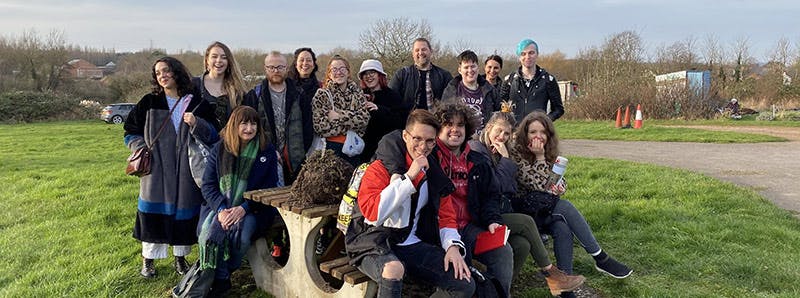
(Birmingham City Allotments Live Project)
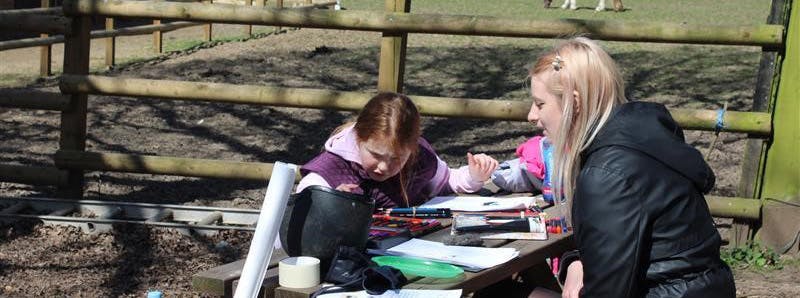
(Moseley Community Stables Art and Education Live Project)
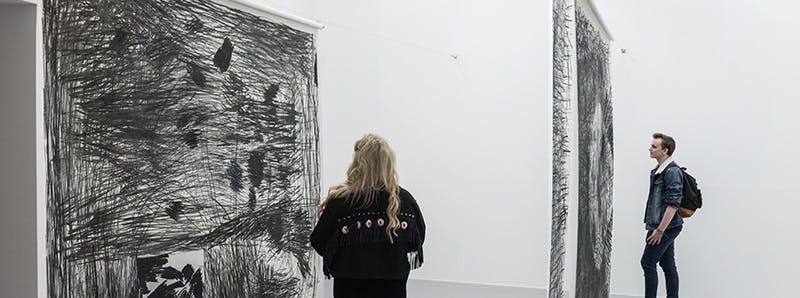
(Ikon Gallery Live Project)

(Tate Gallery Live Project)
Employability
Enhancing your employability skills
With an increased focus on the importance of visible and viable career routes, the BA (Hons) Fine Art with Foundation Year course at Birmingham City University explicitly deals with the importance of employability by embedding professional practice skills needed to allow graduates to ‘make a living’ in all modules. Digital competencies, project management, communication and problem-solving skills are a few of the key attributes the course develops.
The ambitious, student-centred approach to the curriculum, informed by professional practitioners and researchers, will enable you to become imaginative, confident and convincing in the taking and shaping of your future roles. Graduates will become creative leaders and practitioners of change.
Art is a highly individual practice and can often have a high degree of self-reflection but it is always a professional practice. Through a programme of lectures and seminars we enable you, the artists of the future, to understand your own economy and your contribution to the economy of our societies.
Live working is at the heart of the course. It enhances employability by offering you professional experiences and job opportunities which provide you with the competencies, strategies and confidence needed to shape your own futures and the future of the arts. By working with, for and alongside various organisations and stakeholders in the region, the course will demystify the hierarchical structures of the creative sector so you feel ‘at ease’ in these professional contexts.
Specifically you will:
- Develop a range of technical making, professional and personal skills, transferable to a range of careers within the creative industries; from artists, to directors, educators, curators, arts administrators and project managers.
- Develop your own practice and the ability to relate this to future employment options.
- Negotiate, plan exhibit and present work to a professional standard.
- Work independently and collaboratively.
- Be a self-motivated, organised, effective learner.
- Establish meaningful networks and connections in the city with individuals, organisations and communities.
- Understand how to promote yourself through a CV, statement, the use of social media, LinkedIn and individual professional websites.
- Be able to respond to the rapidly evolving creative industries, to not only be ready for immediate employment, but also for future evolutions within the industries through the long-term, future-fit skills you will acquire.
Placements
As a student on our BA Fine Art with Foundation Year course you will be offered the choice of taking one of the ADM Faculty Modules. Each module, delivered within the School of Art (across its BA courses), will have a live focus whether that be working collaboratively across the City with students from across the faculty, working in industry on work experience placements or working with community groups on live project briefs.
The Faculty-wide modules allow for the crossover and building of networks between courses. Through these modules you will be integrated into the City of Birmingham, engaging with local contexts and negotiating external relationships whilst developing key employability skills. Recent live projects have seen students working with; Eastside Projects, Wheatley Fellow Harun Morrison, Flat Pack Film Festival, Summerfield Stables in Hall Green, Turves Green Primary School and Tate Liverpool.
You will also have the option to take a year-long professional work placement sandwich year to spend time directly working in industry through our BA (Hons) Fine Art with Professional Placement Year with Foundation Year. This presents a fantastic opportunity to gain confidence, build experience and develop workplace skills before graduating through a work-based learning opportunity. If you choose this route you will be supported by the course team in researching your chosen area of work and given advice to secure a placement (or placements) that enable you to develop key employability skills in a direct, interesting and meaningful way. It provides the opportunity to spend a year completing structured work experience anywhere in the world, before returning to Birmingham School of Art for the final year of the course to apply what has been learnt working in industry.
Industry links
Birmingham School of Art has a wide array of links with partner organisations regionally, nationally and internationally. These partnerships provide opportunities for live working in a professional context and are an important part of the learning and teaching activities on the BA (Hons) Fine Art with Foundation Year course. The course offers creative opportunities for you to gain direct experience of working with professionals within fine art and related fields on curatorial projects, cross disciplinary opportunities, specialist masterclasses, external live projects and research-based activities.
Regional partners include: Birmingham Museum and Art Gallery, Ikon Gallery, Eastside Projects, Midlands Art Centre, New Walsall Gallery, Vivid Projects, Recent Activity, Grand Union, Queen Elizabeth Hospital, Birmingham Children’s Hospital, Hippodrome, the REP, The Library of Birmingham, Selfridges, Primary and Secondary Schools across the region.
National partners include: Arts Council England, Tate Britain, Tate Modern, Tate Liverpool.
International partners include: BCU has established links with institutions both in Europe and the USA, as well as in Hong Kong and India.
The creative and cultural industries play a significant role in unlocking innovation and growth in other sectors. The creative industries are defined by the UK government as “those industries which have their origin in individual creativity, skill and talent and which have a potential for wealth and job creation through the generation and exploitation of intellectual property”. The creative economy accounts for 1 in 10 jobs across the UK and Birmingham City University is one of the largest providers of graduates in creative disciplines of any University outside London and the South East.
Where our students go
Our students have gone on to work with companies such as:
- British Museum
- BBC
- Tate
And in jobs such as:
- Artist/Designer/Curator
- Exhibition Manager
- Gallery Education Coordinator
International
Birmingham City University is a vibrant and multicultural university in the heart of a modern and diverse city. We welcome many international students every year – there are currently students from more than 80 countries among our student community.
The University is conveniently placed, with Birmingham International Airport nearby and first-rate transport connections to London and the rest of the UK.
Our international pages contain a wealth of information for international students who are considering applying to study here, including:
- Explore some of the good reasons why you should study here.
- Find out how to improve your language skills before starting your studies.
- Find all the information relevant to applicants from your country.
- Learn where to find financial support for your studies.
International students who have a serious interest in studying with us but who perhaps cannot meet the direct entry requirements, academic or English, or who have been out of education for some time, can enter Birmingham City University International College (BCUIC) and begin their degree studies.
BCUIC is part of the global Navitas Group, an internationally recognised education provider, and the partnership allows students to access the University’s facilities and services and move seamlessly through to achieving a Bachelor’s degree from Birmingham City University.
Facilities & Staff
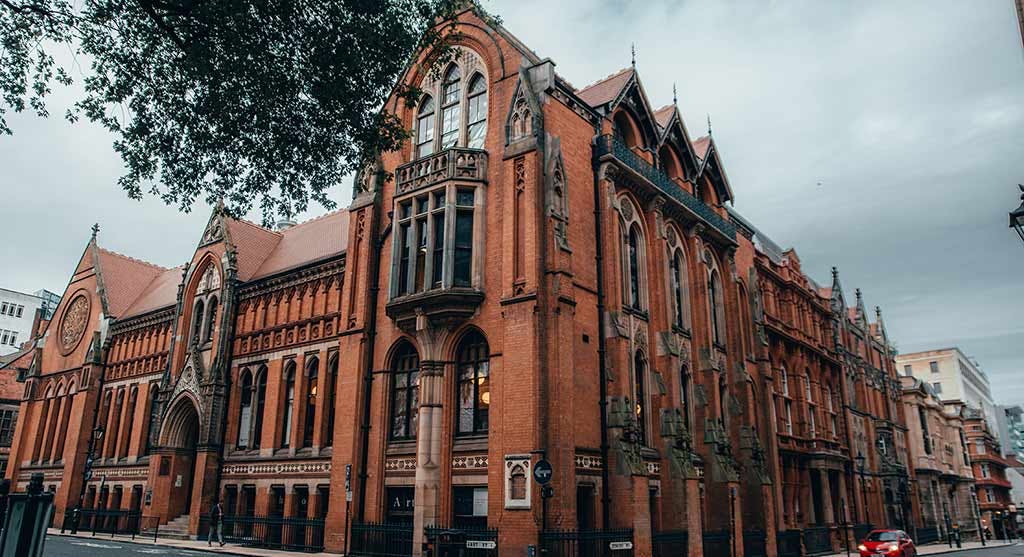
Our Facilities
In 1884 Birmingham Municipal School of Arts and Crafts - the first in the country, opened at Margaret Street where Birmingham School of Art still stands today. This building, with its rich history and rare heritage of practice-led knowledge, is home to our BA Fine Art course.
The studio is at the centre of fine art practice and this course utilises the unique purpose-built School of Art to offer studio spaces as sites of learning situated around specific discipline areas (painting and drawing, sculpture and installation, performance and digital media). As a student on BA (Hons) Fine Art with Foundation Year you will be able to work fluidly within and through the studios both individually and together with other students in a community of practice.
The course aims to celebrate and embed the history of the School of Art through the focus it places on technical, material and process-based fabrication skills. These skills are developed through and within our range of technical workshop facilities for photography, casting, woodwork, metalwork, silk screen, etching, 3D printing, laser cutting, and printed and constructed textiles.
The specialist library, workshops and studio facilities at the School of Art provide a hub of creative activity for you to immerse yourself within.
Take a look around some of our facilities, classrooms, studios and workshops in our virtual walkthroughs, or take a tour of the School below.
Our staff
Jo Newman
Foundation Course Director and BA course leader
Jo chose a career in education so that she could provide students with learning environments where conversations, ideas and materials can be selected, combined, analysed and shared, offering them a way of socializing, caring and questioning to grow their learning with meaning for their futures.
More about JoStuart Whipps
Senior Lecturer in Photography
Stuart Whipps is an artist based in Birmingham, UK. He often makes work about things he doesn’t understand and doesn’t know how to do. Recently this includes restoring a 1979 Mini with the assistance of former British Leyland workers, training to make geological thin sections at the University of Birmingham, and propagating Begonias at West Dean in...
More about StuartAndrew Gillespie
Lecturer in Fine Art
Andrew Gillespie is a contemporary artist based in Birmingham. He is interested in the collision of surfaces, structures and materials. He regularly translates familiar imagery and objects through printmaking and casting, exploiting the shift in status and content that occurs with each gesture. He makes composed constellations of works that often...
More about AndrewAlis Oldfield
Lecturer
Alis Oldfield is an artist whose practice is inherently multidisciplinary, using varying means to immerse the viewer in constructed worlds. Focussing on willing suspensions of disbelief, her work plays with the fictions we create for ourselves. Revealing their own construction, these worlds cultivate friction between fiction and reality – examining...
More about AlisLee Hewett
Lecturer in Fine Art and Art and Design
Lee is an artist, designer, researcher and lecturer who works across a range of disciplines including sculpture, books/publications, web technologies, photography and moving image. Lee has worked on a range of funded research projects, edited journals and also has teaching experience covering a broad range of levels and subject areas including Fine...
More about LeeDr Catherine Baker
Associate Professor of Art and Health
Dr Catherine Baker is an Associate Professor in Art and Health at Birmingham City University (BCU) in the UK. Based at Birmingham School of Art, she is the Faculty Chair for Ethics and Research Integrity and set up and co-led the Material Encounters Research Cluster.
More about CatherineJennifer Wright
Senior Lecturer in Fine Art
Jennifer Wright is an artist and Senior Lecturer, teaching on B.A. (Hons.) and M.A. Fine Art programmes at the School of Art, Birmingham City University but also visiting and examining other Fine Art course in England and Holland. Originally trained as a painter, Jennifer has exhibited both in the UK and internationally since graduating from...
More about JenniferEsther Windsor
Senior Lecturer in Fine Art and Art and Design
Esther is a curator, artist, and writer and has curated at Camerawork Gallery and Darkroom, the ICA, The Photographers’ Gallery, and The Royal British Society of Sculptors. Esther established two art school galleries, the waiting room, University of Wolverhampton and mirror, London College of Printing at London Institute (now LCC at UAL). She was...
More about EstherJohn Wigley
Associate Professor Academic
John Wigley works on both the BA (Hons) Fine Art course and on collaborative practice modules across the Faculty of Arts Design and Media. Trained as a sculptor at the Royal College of Art, his work explores the notion of ‘still life’ and the anxiety we attach to the temporary nature of things – an aspect of the human condition thrown into sharp...
More about JohnJane Watts
Course Director of BA (Hons) Art Business (Level 6 Top-Up)
Jane is an interdisciplinary practitioner, and began her career in textile design. She has since worked as National Craft Advisor for the Women’s Institute in the charity sector, and has 20 years’ experience of teaching in higher education across a range of creative programmes. Alongside running the BA Art Business programme, Jane is also...
More about JaneJoe Miles
Course Leader BA (Hons) Photography
Specialising in commercial and editorial photography for national and international clients, Joe currently leads the BA (Hons) Photography and BA (Hons) Fashion Imaging courses. Experienced in both film and digital photography he has worked with RED cameras, combining moving and still imagery. His extensive list of clients include:...
More about JoeSophie Mackfall
Lecturer
Sophie Mackfall is an artist living and working in Birmingham. She is interested in surfaces and the edges of things, both material and immaterial. Starting with the idea of horizon as a spatial constant and her body as a physical constant to work with and against, she uses economical devices such as a clothesline or the fold of an envelope to...
More about Sophie